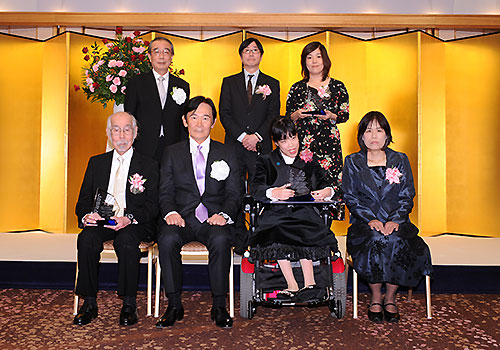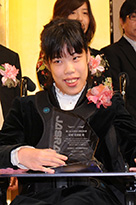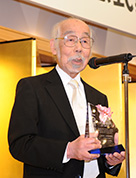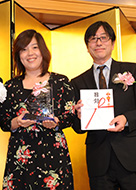- > Top Page
- > About JASRAC
- > JASRAC Music Culture Award
- > “The First JASRAC Music Culture Award”
“The First JASRAC Music Culture Award”
JASRAC Music Culture Award was established as a new award program on JASRAC’s 75th Anniversary. This award aims to create a rich music climate in Japan, by shedding light on individuals, organizations and works in various fields contributing to music culture development through unheralded activities that may not lead to impressive statistics in sales and works usage. Through this recognition for their contributions, JASRAC wishes to provide encouragement for future endeavors.
The first award was presented to the following individuals and group by Mitsuo Sugawara, President of JASRAC, at the 75th Anniversary Commemoration Ceremony on November 18, 2014. The awardees were presented with plaques and sub-prizes.

Kanae Iwasaki

Reason behind her receiving the award
JASRAC awards Kanae Iwasaki to recognize her efforts to have overcome difficulties and her cheerful dedication to piano, which have made a wide audience realize that the power of music exhilarates people, as well as to honor people who turn the power of music into energy to live.
Comment from the awardee (Junko Iwasaki, mother of Kanae Iwasaki)
Hand-in-hand with Kanae, I would like to continue appealing to people all over the world that persons with severe disabilities can also enjoy playing the piano as well as enjoy music.
Profile of the awardee
Kanae Iwasaki was born in 1993 as a very low birth weight infant, which left her with cerebral palsy and disabilities in her extremities and the trunk. She started learning to play the piano under the direction of Yoko (Ozawa) Uchida when she was a first-grader. She currently plays a duet with her mother, mainly using her right forefinger. At “International Piano Festival in Wien by People with Disabilities” in November 2013, she received the Special Audience Award.
Toshiro Kido

Reason behind his receiving the award
JASRAC awards Toshiro Kido to recognize his achievements in energetically working out projects which present the world of tradition to people today and touch their sensibilities, based on solid studies and innovative methods with a broad range of knowledge in both Japanese and Western music.
Comment from the awardee
When a work is praised, it is almost always a composer or a performer that is rewarded for its contributions. On the other hand, a producer is only aware of when a work has a bad reputation from people. My receiving this award may mean that the work of producers was finally recognized.
Profile of the awardee
Toshiro Kido was born in 1930. He is a music producer and a former production director of the National Theater. He develops musical activities in coordination with composers at home and abroad in which he reconstructs traditional works such as Gagaku (Japanese ancient court music and dance) and Shomyo (Japanese Buddhist chanting) in order to turn them into new creations. His musical activities also extend to the studies of musical instruments placed in Shosoin (the treasure house that belongs to Todai-ji temple, Nara) and ancient musical instruments discovered from relics so as to restore them as instruments not as art objects. His presentations of these achievements are well received at academic meetings and music festivals abroad. He received the sixth Kenzo Nakajima Music Award and Kraus Waksman Award ’98 (America Ethnomusicology Society).
“Confiding in Aogiri Tree” Production Committee

Reason behind their receiving the award
In this film “Confiding in Aogiri Tree,” music such as the theme song and inserted songs play a role to deliver the thoughts of bomb survivors effectively. JASRAC awards this film to recognize its efforts in appealing to the public the preciousness of peace and the value of life, ahead of the 70th anniversary of the atomic bombings.
Comment from the awardee (represented by Satomi Nakamura)
I remember a word from Ms. Numata who was a bomb survivor and lived as a storyteller of peace. She told me with a weak voice one month before she passed away that “It would be easy to die, but I must live to tell the story.” We will continue delivering her story with this film and music to people in Japan and all over the world.
Profile of the movie
As the survivors of the nuclear bombings pass away one after another, this film was made with a strong determination that we have reached a time when the younger generation who have not experienced the bombings have to tell the stories of the personal experiences of the victims, based on an idea that putting the message on screen was the best way to reach the greatest number of people. This is a story about a female writer of our time who encounters a journal of a woman who experienced the bombing and lived as a storyteller of peace. Touched by the thoughts of the woman, the writer resolves to convey them herself.
